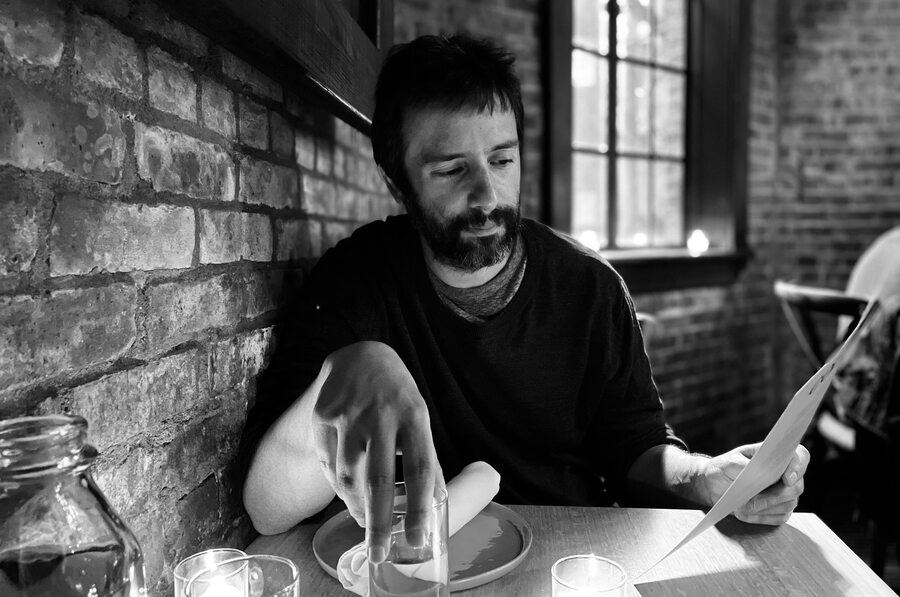Itamar Moses never meant to write musicals. He began his career in the early 2000s as a playwright, with premieres in New York City and regionally at Berkeley Repertory Theatre, the Old Globe, South Coast Repertory, and Portland Center Stage. But he’s now also one of the top book writers for the musical theatre, with a Tony for the 2017 The Band’s Visit.
Moses’s newest musical, an adaptation of the beloved 1986 animated film An American Tail, for which he’s writing book and co-writing lyrics, begins performances next week at Children’s Theatre Company in Minneapolis and runs through June 18th.
In the following interview, which began in December 2019 in Park Slope, Brooklyn, and concluded over Zoom in March 2023, Moses talks about his work on An American Tail and The Band’s Visit (which just had its European premiere at London’s Donmar Warehouse last December), as well as the difference between playwriting and book writing, getting his start in musicals with Nobody Loves You (at the Old Globe in 2012, then Second Stage Theater in 2013), working with the late composer/lyricist Michael Friedman on the musical Fortress of Solitude (at Dallas Theater Center and the Public Theater in 2014), and whether he’ll ever write his own lyrics.
SHOSHANA GREENBERG: How did you get involved in working on An American Tail?
ITAMAR MOSES: Children’s Theatre Company of Minneapolis had acquired the stage rights from Universal, and I just got an email out of the blue one day. I had never worked at CTC. I didn’t really have any relationships there.
Do you know why they thought of you?
[The characters are] mice, but [the story] is fairly clearly an analogue for the human world, and the central figures are a Jewish immigrant family. I’m Jewish, my parents are immigrants, and I had a couple of musicals under my belt at this point. Definitely this was post-Nobody Loves You and Fortress. It was certainly after I was hired to do The Band’s Visit. I was someone people thought of as a book writer. Having worked on three musicals, I could no longer deny that I was one. As it happens, I’m exactly the right age, where I was 9 years old when the movie came out, so if they did that math they might have surmised that it was something that was a big deal in my childhood, which was also true.
It sounds like it was a big film for you.
It wasn’t so much that it was a film I was obsessed with, in the way that kids can watch a movie over and over. It was a big deal for my generation generally and that made an impression on me. I think I watched it for the first time in school on VHS. I went to a Jewish day school in the Bay Area until 5th grade, and when I was 9 I didn’t have a super sophisticated understanding of assimilation versus otherness. But I think probably all the teachers and older kids at this Jewish day school were more consciously aware of the rarity and the import of a mainstream American film having this explicitly Jewish mouse family at the center. I still remember sitting in the classroom and watching it, and the chorus of “There Are No Cats in America” was burned into my memory forever, and “Somewhere Out There,” of course.
What excited you about working on the piece?
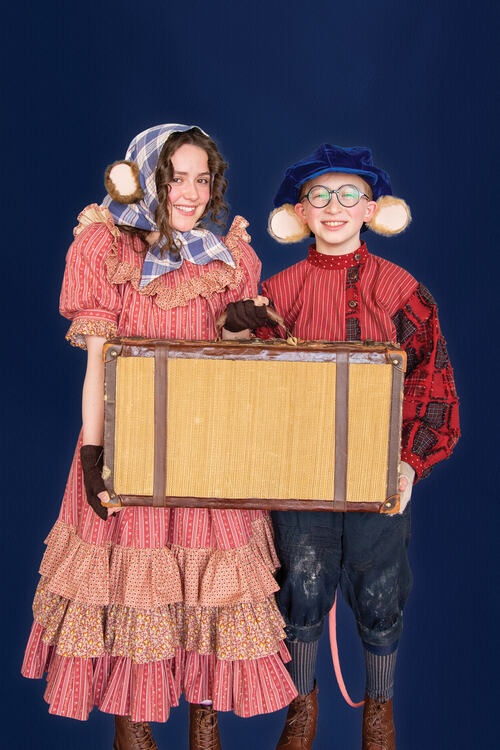
People call me about musicals every now and then, and my default response is to say no because they’re so hard. It’s so rare that anything is a good idea for a musical and that the right elements are being put in place to execute it well. So what excited me was that I had just had a good experience of adapting a movie to the stage—it was much easier than a novel, which is what I tried to do with Fortress—and I’d never done anything for kids. I felt this lightbulb go off in that this is an opportunity to be honest in an even more uncynical way. I also knew, and this was a big appeal for me, that the movie only has three or four songs, and even if we used all of them, we would need to write eight or nine or ten new songs. I love doing lyrics and collaborating on lyrics with composers, and so I thought, it’s going to be writing in the sweet spot of like, you can be funny and you can be smart and you can do clever rhymes that kids will appreciate but also try to make a point.
I also thought, here we are in this really fraught moment around questions of immigration and what is America for and are we living up to our founding principles and credos about welcoming people who come here from other places looking for a better life—which, P.S., virtually all of us did at some point in our family history. So this was a really interesting and valuable moment to bring this story back. It checked a ton of boxes right away.
What are some ways you’ve built out the story?
The core characters and arc of the story is the same. My attitude toward adaptation is always, if it’s not broken, don’t fix it. But what you can do with the action sequences in a cartoon, and the entertainment value you can get out of that, is just simply impossible on stage. The biggest changes that we made had to do with sitting in those moments a little longer and really mining who these different groups of mice are and what their different agendas are. We also expanded the lens a little bit of the number of “mouse immigrant groups” that are represented.
How does this being a known property change your process and the level of freedom you feel?
You just end up honoring the piece. It actually does, up to a certain point, not limit you but give you different parameters. Collaborating with Michael Mahler and Alan Schmuckler as the composers, it’s just been a delight. I talked to a few different composers, and I remember sitting down to lunch with one composer—a fabulous composer I would have been lucky to work with—and they were like, “We’re cutting ‘Somewhere Out There,’ right?” Part of me was like, “That is so badass!” But then a larger part of me was, “Why would you cut ‘Somewhere Out There’? It’s so good!” Not even because it’s famous, but because it does something. We went in considering literally anything to be on the chopping block, but you can’t get rid of things just to change them or put your own stamp on it. You also can’t keep things because, well this is how the movie did it.
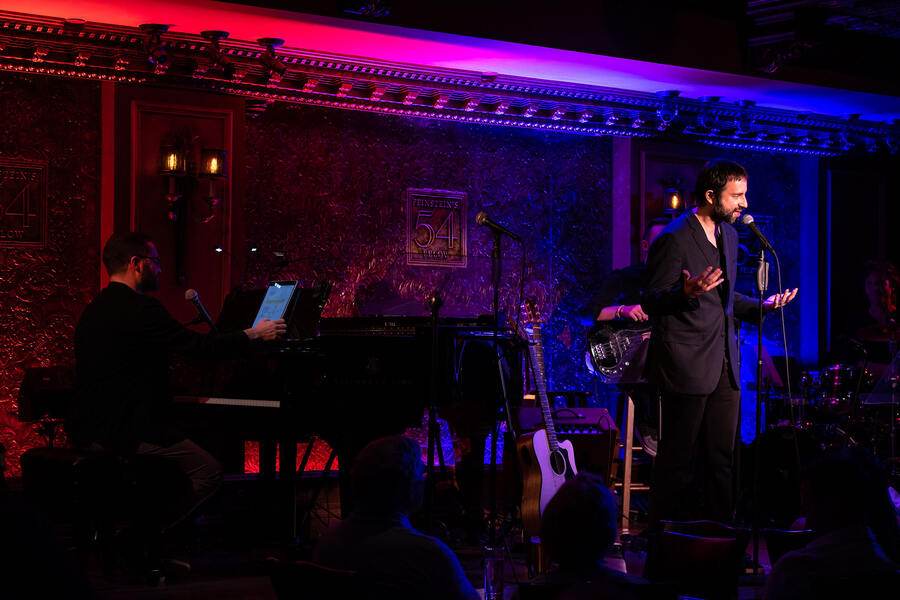
You mentioned you’d had a good experience adapting a movie already, which was The Band’s Visit. When did you first see that film?
I first saw it after my first meeting about the show, which was with Orin Wolf, the producer, and Hal Prince, who was originally going to direct it. They handed me a DVD and were like, “Start by watching this and see if you like this and if you think it should be a musical, and if you think you’re the person who could adapt it.” So that was the first time I watched it, with that potential job in mind.
When you watched it, what were your impressions and thoughts?
Well, if it’s any indication at how good I thought it was, I was not interested in writing another musical. I had just done Nobody Loves You and The Fortress of Solitude back to back, and both of them had been a lot of work. Starting another musical was the last thing I wanted to do. What I liked about the film was how counterintuitive it was. On the one hand, it’s so spare and so internal and so quiet and so short and doesn’t seem to lend itself to spectacle. On the other hand, there’s an organic reason to have music in it because it’s about a band, and I felt like the reason to do it was because it wasn’t what you would expect someone to choose as source material for an adaptation. I watched the movie and felt I saw how to do it and that I might be the right person.
Did you have any concerns about adapting the film?
Before I talked to David Yazbek about it for the first time, I was worried that people weren’t going to share my vision for it. I realized that the reason I wanted to do it, the fact that it could be like an anti-musical, was a little bit perverse, because Orin Wolf is a commercial producer. He wasn’t ultimately producing Band’s Visit so that it would be a tiny show that no one would see. I felt like if Yazbek didn’t see it the same way I did, if he was like, “We really have to razzle-dazzle this up,” that might be a problem. I didn’t know him. I knew his work and I liked it, but Full Monty and Dirty Rotten Scoundrels and Women on the Verge—they’re super interesting but they are more traditionally showy musicals. But from the first time we talked he was saying all the exact same things that I was. It was the reason he wanted to do it: because it was so different from the stuff he’d done in the past. Orin shared our vision too, so we were really protected.
How did you and Yazbek work together?
My first step was to write a script with no songs, and then [Yazbek] wrote one song independently, which was “Answer Me.” Then we sat down together with the rest of the script and went through it page by page and circled what we thought the song moments were. If he was struggling to write a song he would eventually say, “There might not be a song here, and that’s why I can’t write it.” And I’d be like, “Are you sure it’s just not because you’re lazy?” And he’d be like, “No. After one week, it’s because I’m lazy. If I still can’t write it after three weeks, there’s no song.”
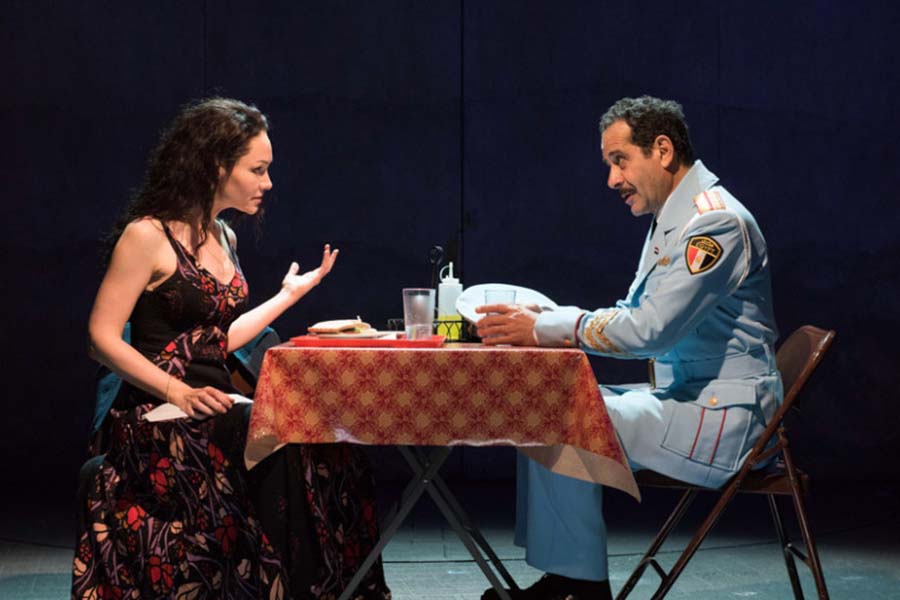
When you’re going through a script, how can you tell where the song moments are?
Sometimes you know with almost certainty, like we knew we wanted Dina to sing a song about Omar Sharif and Umm Kulthum when she talks in the cafeteria. Sometimes you’re not totally sure. And sometimes you get yourself into trouble by thinking about what the “rules” are. It took us a while to accept the fact that we didn’t need a big solo for Tewfiq. I think David wrote at least three songs where Tewfiq is looking at Dina and falling in love with Dina; we could tell that they didn’t belong. We eventually were able to articulate to ourselves that the version of Tewfiq who could sing a big solo about his feelings in the middle of the show didn’t need to go on the journey the show takes him on—that it’s only at the very end of the show that he’s beginning to get back in touch with his feelings.
Another helpful way that I was able to frame it for myself was that Dina is a musical theatre protagonist, which is part of her problem. She’s sort of a romantic and sees her life as this musical where she’s supposed to be this great romantic heroine, and it didn’t happen. And his problem is that he doesn’t see his life as a musical, not anymore, so he’s not in a musical. So it’s a romance between people who are in two different genres of a show.
It really just brings up the question of why are characters singing. When I saw it I felt that it was such a book-heavy musical, and I wondered, was that a conscious decision?
No. It’s funny that you say it’s a book-heavy musical, which I agree with—I mean, there are people who even call it more of a play with music than a musical. It’s a very spare script, but the scenes are very naturalistic and lived-in in a way that maybe is less common in musicals. I think that’s why it feels that way. Not every scene needs to have a song, or not every moment of book is about building towards the song. But that all came from the movie.
Did you ever feel like you were walking a line of, “Is this a play?”
I didn’t think in those terms, but there were times early on where I wondered if we needed more songs or I wrote sections that I thought, “Well, surely David is going to cannibalize this and turn it into a song.” And there were times where that didn’t happen, and I was like, “Do we really just want to leave all of this naked?” That was before we started seeing it with audiences. You can tell when people want a song and you haven’t given it to them, and you can tell when you’ve given them a song and they didn’t want one. People have all these rules for musicals, but the rule is just do whatever works for your musical in that moment.
What first got you into playwriting?
I went to Berkeley High, which is the only public high school in Berkeley, California. It’s like a big, crazy, diverse, weird, artsy high school, and there were a couple of guys a few years older who were doing theatre, not like theatre at the school, but they were like doing their own plays and putting them on in this, like, black-box theatre in Berkeley under a pizza place. One of them was Gaby Alter, who I would go on to write Nobody Loves You with. I remember going to see the plays and early rock operas that this theatre company was doing that Gaby was a part of, and I was like, “That’s really cool.” I wanted to be doing that—to impress other people the way that those guys were impressing me. And then I was in high school in the early ’90s, Angels in America had been on Broadway and then it was going back out across the country. ACT in San Francisco was one of the big regional post-Broadway productions, and I went to see both parts of that my senior year of high school. I’d read it the year before, and then I saw it, and after I saw it I started my first play the next day.
Had you been interested at all in musicals at this point?
I liked musicals. I was never that interested in writing them. The first one I wrote because Gaby moved to New York a few years after I did, and he went to NYU’s musical theatre writing program a few years after I’d gone to their MFA playwriting program. When he graduated, it was just like, “Well, we’re hanging out anyway. I write plays. You write musicals. We should write a show together.”
And were you just like, let me jump into this?
I was very cocky and hubristic about it. I was like, “This doesn’t seem that hard.” And I wanted to write lyrics. I was like, “I’m good at rhyming.” I had no training whatsoever in book writing. I dove in knowing nothing, which is the best way to start something.
Right, learning by doing. Were there elements of book writing that took you by surprise?
In my early musical theatre writing, there were times when I would let myself lose an argument because somebody involved would say, “Well, that might be how you do it in a play, but in a musical you have to do it this way.” What I eventually realized was that I should still trust my instincts. You really just have to learn what the tools are and then use those tools to engage people in the same way. I mean, I was being glib before when I said I didn’t think it would be hard; I knew just how hard it is to make a musical work. I’ve written plays. I’ve also written screenplays. I’ve written for television. Musicals are by far the hardest form I’ve ever worked in—by far. They’re impossible, basically, to make work.
Could you articulate what makes them so impossible?
It’s just a Frankenstein form that shouldn’t work. It doesn’t make any sense. Every single time you transition from speech to song it’s like a magic trick, and then no one really understands how to make a song work. It’s an “I Want” song. Okay, but the song has to advance the action. Well, what do you mean by action? And anything you can think of as a rule, you can come up with 10 counter-examples that work. So on a craft level, it’s just this incredibly complicated piece of machinery. Every single musical is different. Almost nothing you learned on your last musical will help you on the next one.
Then, producerially, with a play, if I have a draft of a play and there aren’t 50 people in it, I can get five or six friends who are actors over to my apartment and they will just read it cold, and I’ll give them all pizza and I pretty much know what I have. You can’t know what you have with a musical. You need a week or two weeks of rehearsal and tens of thousands of dollars, and even then there are things you don’t know about whether a musical works until you’re in previews, at which point it’s too late to change anything except five or 10 percent of it. So they’re really hard to get right, and it’s really hard to know what you got wrong until it’s too late.
Yeah, the economics of musicals nobody really talks about. I also write musicals.
I can see from the pain on your face that you recognize everything I’m saying.
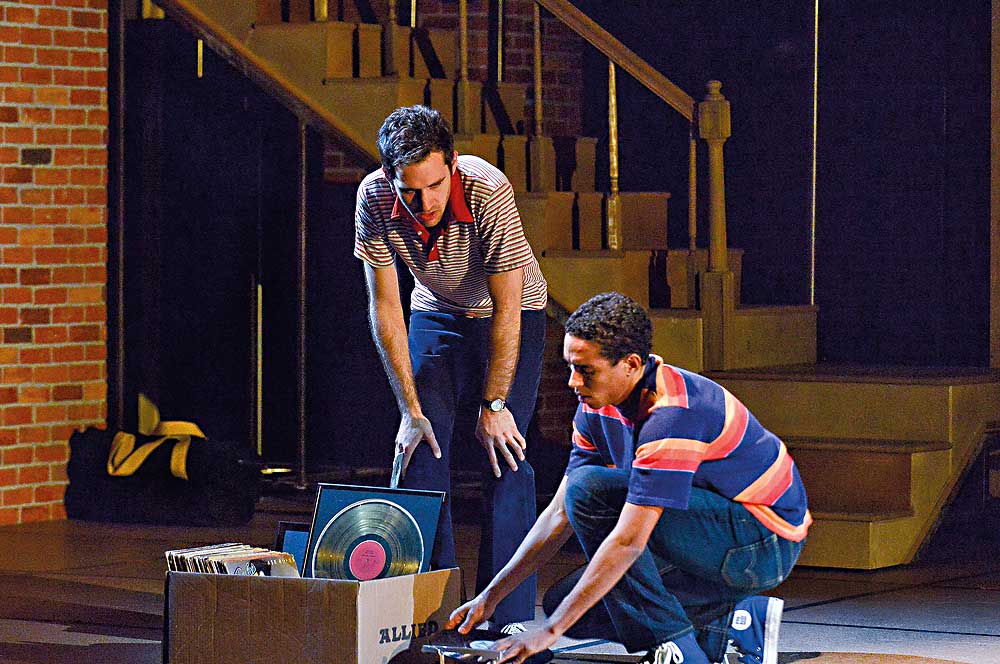
So nobody mentored you in the craft of book writing?
Yeah, I didn’t have a specific mentor—Gaby initially, and then Michelle Tattenbaum, who directed Nobody Loves You. She’s a great dramaturg and someone who understands the mechanics of how to put together a musical and can articulate it in a smart way. Then I learned a lot working on Fortress of Solitude in sort of a trial-by-fire way, because capturing that narrative dramatically was so hard, and Michael Friedman just beamed this otherworldly score at me that was exquisite but almost entirely anti-narrative. And so my mentor on Fortress was the impossibility of the task, which is why I failed at it. In a way, nothing will ever be as hard as trying to make Fortress of Solitude work.
So you are officially saying you failed at that task?
I think things about that show worked really well. I think that what we opened with at the Public Theater, I wasn’t completely satisfied with, but we’ve continued to work on it. It’s obviously enormously complicated now by Michael’s death, but the three of us, Daniel Aukin and Michael and I, had already done another incarnation of it with the grad students at NYU. It was more stripped down. So we still talk about how we can move that forward.
What was that writing experience like, especially working with Michael?
It was a lot of things. It was really inspiring. It was really difficult because it’s a dense 500-page novel, and going from a novel to stage is really hard. And Fortress is a very internal novel, so to even figure out what the rules of that show were was really hard and a process that’s not over. But I respect Daniel and Michael so much and so it created this really powerful, special bond between the three of us. The material was so difficult and upsetting—it’s a very sad story—and that feeling, that bond extended, I think, to a lot of the actors who were with it from early workshops. I met my wife on that show.
So it’s very momentous.
It was a really important, impactful experience in my life, but one I had a lot of feelings about even before Michael died. And then, once Michael died—there’s something tragic about how people who know his work widely regard [Fortress] as maybe his best score, and so apart from just the impossible-to-articulate tragedy of his death and the idea of all the unwritten shows, and then the broader sense of like—it sounds so petty and small to be like, “He didn’t get his due,” because his life was about all kinds of things. But it foreclosed something. It foreclosed him getting to see that score being embraced in the way that I think it deserves.
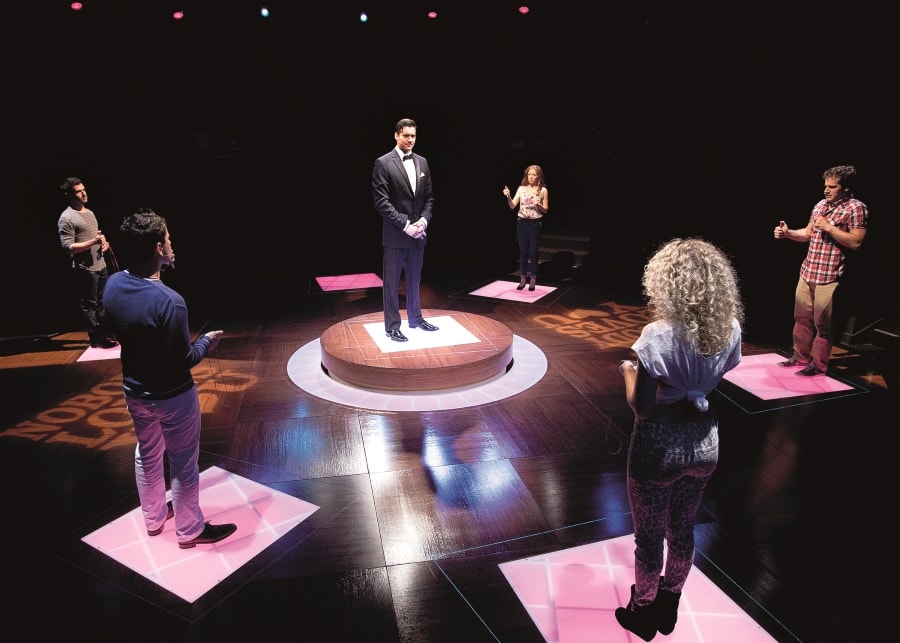
Just to touch on Nobody Loves You, which is about a reality dating show and someone who’s writing their dissertation on reality TV—where did that idea come from?
An idea I had at one point was, well, we should parody reality TV, because it gives you a great reason to sing. Anything that has reality, and then a heightened level of reality, is great for a musical, because whenever you’re in the heightened world, that’s what earns you the songs. So I was like, when people are on camera, they’ll sing.
After Nobody Loves You closed there were TV shows like UnREAL, which was behind the scenes of a reality TV dating show. Did that bring back any interest to your show?
I feel like the question behind your question, to which the answer is yes, is: Was your show weirdly prescient and ahead of the times? What’s funny, when we were first writing it, we would tell people the idea and they’d say, “Oh, you’d better hurry up and finish that because this reality TV phase is going to go away,” and I remember thinking, “This thing’s never going away.” The darkness I think the show is investigating rules all of our lives now, so that is part of the argument we make when we pitch it to people for bringing it back. I don’t know if you ever feel a musical is done. I never feel like a play is completely done.
I also wanted to ask, because you co-wrote the lyrics for that show—
I love writing lyrics.
And now you’re writing lyrics again.
It’s just a different challenge and it’s fun. You get a little bit more control over how the thing unfolds. It depends who you’re working with. Even if I might want to write lyrics, it’s not a good idea with every lyric writer. I don’t think Yazbek and I would complement each other as a lyric-writing team, whereas Gaby and I do, for instance.
Would you ever be the sole lyricist on a project?
Yeah, I would do that. I’d be a little more afraid of that, because it’s useful to have someone who pulls back some of my more byzantine—like, in my collaboration with Gaby, he’s the one who’s always like, “What is the emotional content that we’re trying to get across?” And I’m like, “How many internal rhymes can we fit in this one line?”
Well, you need that too, especially if you’re doing comedy. And are your plans to do more book writing or playwriting?
I’ve pivoted more back toward playwriting. I have sort of signed on to a couple of musicals, but the bar is set pretty high now for me to say yes to them. So my position is still that I don’t want to write musicals, so I’m only going to write like three more.
It’s good to hear you have some in your future.
Maybe five. [Laughter] Although I do recognize that the chances of anything quite like what happened with The Band’s Visit ever happening again are essentially zero. But it’s more about the people than anything else. If you pick people you want to work with on stuff that you care about, you can’t go too wrong.
Shoshana Greenberg (she/her) is a writer based in New York City.

